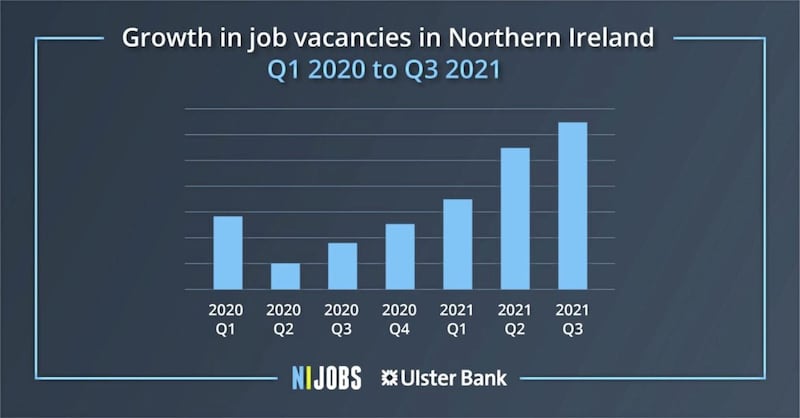A POST-lockdown recruitment boom is under way in the north, according to a new report from NIJobs.
The recruiter said the number of vacancies in Northern Ireland hit a record high in the third quarter of 2021, with massive demand in the healthcare and hospitality sectors.
Job listings during the first nine months of 2021 were 50 per cent above pre-pandemic levels in 2019, while demand for labour over the July to September period was almost six times the level reported during the second quarter of 2020.
Ulster Bank’s chief economist, Richard Ramsey, said 18 months on from the worst ever economic storm to hit Northern Ireland’s labour market, the concern is no longer about a surge in redundancies, rather how to cope with staff shortages.
“Vacancies in the UK have hit a 20 year high of 1.1 million. It is a similar picture in Northern Ireland too with job vacancies hitting a fresh record high in the third quarter.
“This highlights that the Spring hiring spree has continued throughout the summer with sectors such as hospitality on a major recruitment drive to deal with the staycation boom.”
The first official labour market data published since the end of the furlough scheme last week showed the north easing to a relatively soft landing, with no recorded cases of new redundancies being proposed by employers during September.
The latest NIJobs report showed advertised vacancies up by 14 per cent between the second and third quarters, the fifth consecutive quarterly rise.
Almost one-in-five of all vacancies listed on NIJobs were in healthcare, while hospitality vacancies jumped by 44 per cent in the third quarter.

Sam McIlveen, general manager at NIJobs, described the competition for talent as “immense”.
“Our data shows that applications have actually increased compared to this time last year so people are on the move but the volume of jobs available means they can pick and choose.
“The end of furlough should bring more applicants forward for roles, but the ongoing skills shortages and experience required to meet current demand is proving difficult for employers.”
Richard Ramsey said skills shortages have triggered “inflation busting pay increases” in some areas.
“Pay has become an even more sensitive issue given the evolving cost-of-living crisis,” he added.
“The majority of workers are likely to see pay fail to keep up with the rising cost of living. “This has implications for employers’ ability to attract and retain staff in what is a sellers’ market.”
The economist said the pandemic has also prompted widespread reflection among the workforce, with people more motivated by lifestyle and flexibility than pay levels, sometimes dubbed ‘the Great Resignation’.
“With incomes squeezed, the demand for more significant pay rises from employers will intensify.
“For some sectors, such as the hospitality sector which already faced a bumpy road to recovery, rising wage and energy costs presents a significant challenge,” he said.
“For workers, moving jobs may be their only way to secure a meaningful pay rise in the face of the rising cost of living.
“As a result, we can expect the recruitment market to remain very active in the months ahead.”








